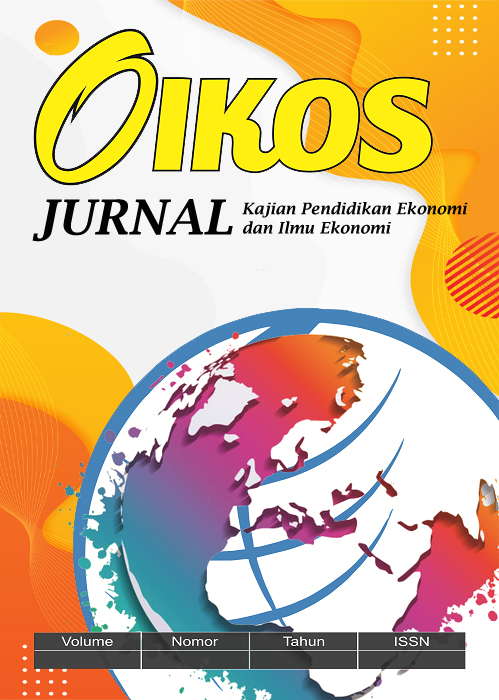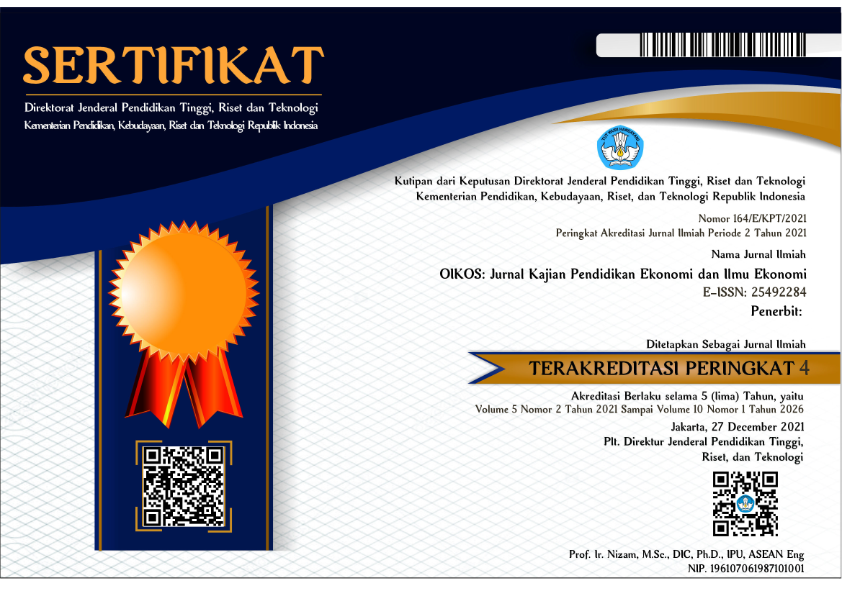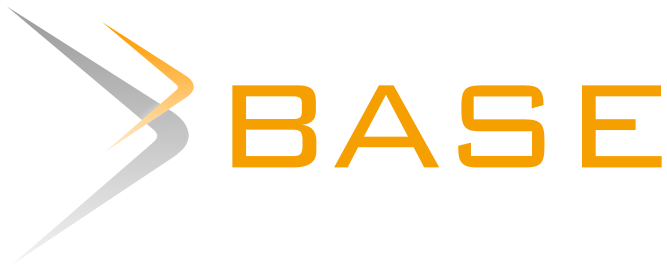PENGARUH ENTREPRENEURIAL SELF-EFFICACY TERHADAP GREEN ENTREPRENEURIAL INTENTION YANG DIMEDIASI OLEH PENDIDIKAN KEWIRAUSAHAAN
Survei pada Mahasiswa Startup Fakultas Pendidikan Ekonomi dan Bisnis Universitas Pendidikan Indonesia.
DOI:
https://doi.org/10.23969/oikos.v7i2.7538Abstract
Green entrepreneurial Intention as a form of individual attitude can be influenced by performance and the social environment can be influenced by self-efficacy, individuals involved in the business organization. In realizing this, it is necessary to conduct research to test empirically the Effect of Green Entrepreneurial Intention on Entrepreneurial Self-Efficacy mediated by Entrepreneurship Education. The main objective of this study was to examine the effect as measured subjectively by students. Not a few business people only care about profits, regardless of threats to environmental sustainability. This type of research is quantitative using survey methods. The sample collection technique in this study used the Proportional Allocation technique. The results of this study indicate that there is an influence of Entrepreneurial Self-Efficacy on Green Entrepreneurial Intention which is mediated by entrepreneurship education. This is based on hypothesis testing partial and simultaneous where each of these variables has an influence.
Keywords: Entrepreneurial Self-Efficacy, Green Entrepreneurial Intention, Entrepreneurship education.
Downloads
References
Daftar Pustaka
Abreu, M., & Grinevich, V. (2013). “The nature of academic entrepreneurship in the UK: Widening the focus on entrepreneurial activities.”. Research Policy, 42(2), 408–422. https://doi.org/10.1016/j.respol.2012.10.005
Afrianty, T. W. (2019). “The Role of Feasibility And Entrepreneurial Self-Efficacy on The Link Between Entrepreneurship Education and Entrepreneurial Intentions.” AdBispreneur : Jurnal Pemikiran Dan Penelitian Administrasi Bisnis Dan Kewirausahaan, 4(3), 193–206.
Ahmed, I., Islam, T., & Usman, A. (2021). “Predicting entrepreneurial intentions through self-efficacy, family support, and regret: A moderated mediation explanation.” Journal of Entrepreneurship in Emerging Economies, 13(1), 26–38. https://doi.org/10.1108/JEEE-07-2019-0093
Akinsemolu, A. A. (2020). “The principles of green and sustainability science. In The Principles of Green and Sustainability Science.” https://doi.org/10.1007/978-981-15-2493-6
Allen, J. C., & Malin, S. (2008). “Green entrepreneurship: A method for managing natural resources? Society and Natural Resources, 21(9), 828–844.” https://doi.org/10.1080/08941920701612917 Amankwah, J. (2021). On the Relation between Green Entrepreneurship Intention and Behavior.
Alwisol, Alwisol. “Psikologi kepribadian edisi revisi.” (2004).
Anisah, H. U. (2015). “Pembentukan Green Entrepreneurial Behavior Pada.” 80, 397– 415.
Balasubramanian, A. (September 5, 2012). “Entrepreneurship Education.” The Hindu.
Bandura, Albert, and Nancy E. Adams. “Analysis of self-efficacy theory of behavioral change.” Cognitive therapy and research 1.4 (1977): 287-310.
Bangi, B. B. (2019). “Factors Impacting Green Entrepreneurial Intention Among Small And Medium.” 193–208.
Braunerhjelm, P., Acs, Z. J., Audretsch, D. B., & Carlsson, B. (2010). “The missing link: Knowledge diffusion and entrepreneurship in endogenous growth.” Small Business Economics, 34(2), 105– 125. https://doi.org/10.1007/s11187-009-9235-1
Bullough, A., Renko, M., & Myatt, T. (2014). “Danger zone entrepreneurs: The importance of resilience and self-efficacy for entrepreneurial intentions.” Entrepreneurship: Theory and Practice, 38(3), 473–499. https://doi.org/10.1111/etap.12006
Chairul hakim, K. (2020). “Self Efficacy, Locus Of Control dan Kompetensi Serta Pengaruhnya Kepada Kinerja (Studi Kasus Pengusaha UMKM di Kecamatan Darmaraja, Sumedang Barat).” Jurnal Computech & Bisnis, 14(1), 52–57.
Demirel, P., Li, Q. C., Rentocchini, F., & Tamvada, J. P. (2019). “Born to be green: new insights into the economics and management of green entrepreneurship.” Small Business Economics, 52(4), 759–771. https://doi.org/10.1007/s11187-017-9933-z
Diputra, I., Arismunandar, & Jufri, M. (2021). “Entrepreneurial Self-Efficacy Compromising The Pros and Cons of The Relationship Between Personality Traits and Entrepreneurial Success. Multicultural Education, 7(7), 176–187.” https://doi.org/10.5281/zenodo.5090790
D'Souza, Clare, et al. “Green products and corporate strategy : an empirical investigation.” Society and business review (2006).
Eliyana, A., Musta’In, Sridadi, A. R., & Widiyana, E. U. (2020). “The role of self-efficacy on self-esteem and entrepreneurs achievement.” Systematic Reviews in Pharmacy, 11(8), 314–319. https://doi.org/10.31838/srp.2020.8.48
Et.al, N. E. A. (2021). “The Influence of Computer and Internet Self-Efficacy on Individual Entrepreneurial Orientation: An Empirical Study among Bumiputra University Students in Malaysia.” Turkish Journal of Computer and Mathematics Education (TURCOMAT), 12(3), 2760–2770. https://doi.org/10.17762/turcomat.v12i3.1305
Farinelli, F., Bottini, M., Akkoyunlu, S., & Aerni, P. (2011). “Green entrepreneurship: the missing link towards a greener economy.” ATDF Journal, 8(3/4), 42–48.
Fayolle, Alain, and Benoît Gailly. “Assessing the impact of entrepreneurship education: a methodology and three experiments from French engineering schools.” Handbook of university-wide entrepreneurship education. Edward Elgar Publishing, 2009.
Ge, L., & Peng, X. (2012). “Research fronts of international entrepreneurship education in the visual threshold of knowmetrics.” Journal of Knowledge-Based Innovation in China, 4(1), 55–65. https://doi.org/10.1108/17561411211208767
Gevrenova, T. (2015). “Nature and characteristics of green entrepreneurship.” Trakia Journal of Science, 13(Suppl.2), 321–323. https://doi.org/10.15547/tjs.2015.s.02.068
Gibb, Allan A. “Enterprise culture and education: understanding enterprise education and its links with small business, entrepreneurship and wider educational goals.” International small business journal 11.3 (1993): 11-34.
Gufron, Nur, and Rini Risnawati. “Perbedaan Budaya Dalam Kepercayaan Epistemologi Personal.” Edukasia 9.2 (2014).
Gunawan, J., & Fraser, K. (2016). “Exploring young and green entrepreneurship in Indonesia: An introduction.” Journal of Asian Business Strategy, 6(8), 185–194. https://doi.org/10.18488/journal.1006/2016.6.9/1006.9.185.194
Hägg, G., & Kurczewska, A. (2021). “Toward a Learning Philosophy Based on Experience in Entrepreneurship Education.” Entrepreneurship Education and Pedagogy, 4(1), 4–29. https://doi.org/10.1177/2515127419840607
Haldar, S. (2019). “Green entrepreneurship in theory and practice: Insights from India.” International Journal of Green Economics, 13(2), 99–119. https://doi.org/10.1504/IJGE.2019.103232
Hameed, I., Zaman, U., Waris, I., & Shafique, O. (2021). “A Serial-Mediation Model to Link Entrepreneurship Education and Green Entrepreneurial Behavior : Application of Resource- Based View and Flow Theory.
Hassan, Aamir, et al. “Individual entrepreneurial orientation, entrepreneurship education and entrepreneurial intention: The mediating role of entrepreneurial motivations.” Industry and Higher Education 35.4 (2021): 403-418.
Hugo, E. M., & Nuringsih, K. (2020). “Entrepreneurial Education, Green Orientation Entrepreneur, dan Green Value terhadap Ecology Entrepreneurial Intention.” Jurnal Manajerial Dan Kewirausahaan, 2(4), 914–924. https://journal.untar.ac.id/index.php/JMDK/article/view/9871/6519
Hussain, I., Nazir, M., Hashmi, S. B., Shaheen, I., Akram, S., Waseem, M. A., & Arshad, A. (2021). “Linking green and sustainable entrepreneurial intentions and social networking sites; the mediating role of self-efficacy and risk propensity. Sustainability (Switzerland), 13(13). https://doi.org/10.3390/su13137050
Hutabarat, Z., Larson, D., & Irawan, M. D. (2021). “Pengaruh Perceived Parental Reward, Entrepreneurial Self Efficacy, Yang Dimoderasi Family Business Involvement Terhadap Entrepreneurial Intention Di Universitas Pelita Harapan.” IDEI: Jurnal Ekonomi & Bisnis, 2(1), 54–68. https://doi.org/10.38076/ideijeb.v2i1.59
Jamieson, I. (1984). “Schools and Enterprise.” In Watts, A. & Moran, P. (eds.) Education for enterprise. Cambridge: CRAC
Jiang, H., Wang, S., Wang, L., & Li, G. (2020). “Golden apples or green apples? The effect of entrepreneurial creativity on green entrepreneurship: A dual pathway model.” Sustainability (Switzerland), 12(15). https://doi.org/10.3390/SU12156285
Johannisson, B. & Olaison, L. (2006). “Emergency Entrepreneurship – Creative Organising in the Eye of the Storm, RENT XX Conference, Brussels, Belgium, 23-24.11.2006.”
Jones, Colin, and Jack English. “A contemporary approach to entrepreneurship education.” Education+ training (2004).
Karimi, R. F., & Nabavi Chashmi, S. A. (2019). “Designing Green Entrepreneurship Model in Sustainable Development Consistent with the Performance of Tehran Industrial Towns.” Journal of Business-to-Business Marketing, 26(1), 95–102. https://doi.org/10.1080/1051712X.2019.1565143
Karlsson, Tomas, and Kåre Moberg. “Improving perceived entrepreneurial abilities through education: Exploratory testing of an entrepreneurial self efficacy scale in a pre-post setting.” The International Journal of Management Education 11.1 (2013): 1-11.
Keling, M., & Sentosa, S. U. (2020). “The Influence of Entrepreneur Learning, Self-Efficacy and Creativity Toward Students Entrepreneurial Interests of Tarbiyah and Teachers Training Faculty, Universitas Islam Negeri Sumatera Utara.” 124, 575–581. https://doi.org/10.2991/aebmr.k.200305.121
Kenney, M., & Patton, D. (2009). “Reconsidering the Bayh-Dole Act and the Current University Invention Ownership Model.” Research Policy, 38(9), 1407–1422. https://doi.org/10.1016/j.respol.2009.07.007
Kirby, David A. “Entrepreneurship education: can business schools meet the challenge?.” Education+ training (2004).
Kumar, S., Kumar, P., Wisetsri, W., Raza, M., & Norabuena-Figueroa, R. P. (2021). “Social entrepreneurship education: Insights from the indian higher educational courses.” Academy of Strategic Management Journal, 20(SpecialIssue2), 1–8
Li, Jing. “The evolution of entrepreneurial intention in transition environment: Toward an entrepreneurial self-efficacy based model.” 2008 4th International Conference on Wireless Communications, Networking and Mobile Computing. IEEE, 2008.
Li, Z., & Liu, Y. (2011). “Entrepreneurship education and employment performance.” Journal of Chinese Entrepreneurship, 3(3), 195–203. https://doi.org/10.1108/17561391111166975
Liang, C., Ip, C. Y., Wu, S. C., Law, K. M. Y., Wang, J. H., Peng, L. P., & Liu, H. C. (2019). “Personality traits, social capital, and entrepreneurial creativity: comparing green socioentrepreneurial intentions across Taiwan and Hong Kong.” Studies in Higher Education, 44(6), 1086–1102. https://doi.org/10.1080/03075079.2017.1418310
Mahmud, Amir dan Sa’adah L 2019. “Pengaruh penggunaan Instragram dan Efikasi
diri melalui motivasi berwirausaha terhadap minat berwirausaha.” Journal.unes.ac.id/sju/index.php/eeaj. ISSN 2252-6544. Universitas Negeri Semarang. http://Journal.unes.ac.id/sju/index.php/eeaj.
Mulyadi, Hari dan Prawiranegara. 2018. “Pengaruh Pembelajaran Kewirausahaan
terhadap Motivasi Berwirausaha.” Volume 18 No. 1. Universitas Pendidikan Indonesia.
Marini, C. K., & Hamidah, S. (2014). “Pengaruh self-efficacy, lingkungan keluarga, dan lingkungan sekolah terhadap minat berwirausaha siswa SMK jasa boga.” Jurnal Pendidikan Vokasi, 4(2), 195–207. https://doi.org/10.21831/jpv.v4i2.2545
McGee, Jeffrey E., and Mark Peterson. “The long‐term impact of entrepreneurial self‐efficacy and entrepreneurial orientation on venture performance.” Journal of small business management 57.3 (2019): 720-737.
Minniti, Maria, and William Bygrave. “A dynamic model of entrepreneurial learning.” Entrepreneurship theory and practice 25.3 (2001): 5-16.
Mirenowicz, Jacques, and Wolfram Schultz. “Importance of unpredictability for reward responses in primate dopamine neurons.” Journal of neurophysiology 72.2 (1994): 1024-1027.
Mohsen, A. (2018). “Green Entrepreneurship in Afghanistan: Prospects and Challenges.” The Asian Journal of Technology Management (AJTM), 11(1), 44–54. https://doi.org/10.12695/ajtm.2017.11.1.4
Mukonza, C. (2020). “An Analysis of Factors Influencing Green Entrepreneurship Activities in South Africa.” In Advances in African Economic, Social and Political Development. https://doi.org/10.1007/978-3-030-44180-7_3
Nguyen, An, and Colleen M. Lewis. “Competitive enrollment policies in computing departments negatively predict first-year students' sense of belonging, self-efficacy, and perception of department.” Proceedings of the 51st ACM Technical Symposium on Computer Science Education. 2020.
Nguyen, T. T. (2020). “Impact of entrepreneurship environmental support factors to university students entrepreneurship self-efficacy.” Management Science Letters, 10(6), 1321–1328. https://doi.org/10.5267/j.msl.2019.11.026
Niu, Han-Jen. “Investigating the effects of self-efficacy on foodservice industry employees’ career commitment.” International Journal of Hospitality Management 29.4 (2010): 743-750.
Nordin, R., & Hassan, R. A. (2019). “The Role of Opportunities for Green Entrepreneurship Towards Investigating the Practice of Green Entrepreneurship among SMEs in Malaysia.” Review of Integrative Business and Economics Research, 8(1), 99–116. http://buscompress.com/uploads/3/4/9/8/34980536/riber_8-s1_08_s18-156_99-116.pdf
Osobajo, O. A., Otitoju, A., Otitoju, M. A., & Oke, A. (2020). “The impact of energy consumption and economic growth on carbon dioxide emissions.” Sustainability (Switzerland), 12(19), 1–16. https://doi.org/10.3390/SU12197965
Pachaly, M. V. W. Barriers and Triggers to Green Entrepreneurship. Diss. Doctoral dissertation, Thesis, Erasmus Universiteit Rotterdam, 2012.
Pittway, L. and Cope, J. (2007). “Entrepreneurship education: a systematic review of the Evidence.” International Small Business Journal, Vol. 25 No. 5, pp. 479-510,
Polas, M. R. H., Hossain, M. I., Tabash, M. I., Karim, A. M., Dad, A., & Ong, T. S. (2020). “Does Green Entrepreneurial Intention Persuade an Individual to Contribute to the.” Sustainable Green Economy? Talent Development & Excellence, 12(2), 1142–1157. http://www.iratde.com
Rae, David. “Understanding entrepreneurial learning: a question of how?." International Journal of Entrepreneurial Behavior & Research (2000).
Supardi, Endang, Amir Mahmud dan Mirza Irwanda. 2022. Pengukuran Efektivitas Pembelajaran Kewirausahaan dalam Mengembangkan Keterampilan Wirausaha di Unversitas Pendidikan Indonesia Bandung. Pascasarjana, Pendidikan Ekonomi/Universtias Pendidikan Indonesia, Bandung. Vol. 6 – No. 1, year (2022), page 770-778.
Supardi, Amir dan Dita. 2021. Opportunity Recognition and Green Entrepreneurial Intention: The Moderating Effect of Entrepreneurship Education. Jurnal Pendidikan Bisnis dan Manajemen, Volume 7, Number 1, July 2021, Pages 42-55.
Salahudin, A., Ramli, M. A., Zulkepli, M. I. S., & Razak, M. I. A. (2018). “Issues in Halal Meat Product and Authentication Technology from Islamic Perspectives.” International Journal of Academic Research in Business and Social Sciences, 7(12). https://doi.org/10.6007/ijarbss/v7-i12/3768
Santrock, John W., and John W. Santrock. “Psikologi Pendidikan edisi kedua.” (2007).
Schunk, Dale H., and Barry J. Zimmerman. “Modeling and self-efficacy influences on children’s development of self-regulation.” Social motivation: Understanding children’s school adjustment (1996): 154-180.
Self, D. A. N., Terhadap, E., Berwirausaha, M., Farida, S., & Nurkhin, A. (2016). “Economic Education Analysis Journal.” 5(1), 273–289.
Sinta, T. (2020). “Economic Education Analysis Journal.” 9(3), 816–830. https://doi.org/10.15294/eeaj.v9i3.42113
Solow, R. M. (1956). “A Contribution to the Theory of Economic Growth Author (s): Robert M. Solow Source.” The Quartely Journal of Economics, 70(1), 65–94. http://www.jstor.org/stable/1884513
Sudyasjayanti, Christina. “The green behavior differences of green entrepreneur intentions among male and female students.” (2017).
Tesprasit, K., & Kanchanavibhu, A. (2020). “Building Green Entrepreneurship: A Journey of Environmental Awareness to Green Entrepreneurs in Thailand.” 27(October), 35–47.
Unud, E. M. (2016). “Berwirausaha Yang Dimediasi Oleh Sikap Berwirausaha Ekonomi Dan Bisnis Universitas Udayana (Unud), Bali Indonesia Kemiskinan dan pengangguran merupakan masalah yang sering dijumpai di negara-negara berkembang, salah satunya Indonesia.” Setiap pergantia. 5(12), 8167–8198.
Uslu, Y. D., Hancıoğlu, Y., & Demir, E. (2015). “Applicability to Green Entrepreneurship in Turkey: A Situation Analysis.” Procedia - Social and Behavioral Sciences, 195, 1238–1245. https://doi.org/10.1016/j.sbspro.2015.06.266
Vargas-Hernández, José G., Mohammad Reza Noruzi, and Narges Sariolghalam. “An exploration of the affects of Islamic culture on entrepreneurial behaviors in Muslim countries.” Asian Social Science 6.5 (2010): 120.
Wahyu Pril Ranto, D. (2017). “Pengaruh Entrepreneurial Traits Terhadap Intensi Kewirausahaan.” JBTI : Jurnal Bisnis Teori Dan Implementasi, 8(1), 36–44. https://doi.org/10.18196/bti.81081
Wijaya, David. “Pendidikan Kewirausahaan untuk sekolah dan perguruan tinggi.” Yogyakarta: Pustaka Pelajar (2017).
Wikaningtyas, Suci Utami, D. (2019). “Pengentasan Kemiskinan: Model Membangun Motivasi Menjadi Pengusaha Ramah Lingkungan (Green Entrepreneur).”
Yaacob, Mohd Rafi. “A preliminary study of green micro-entrepreneurs in Kelantan, Malaysia.” International Journal of Business and Management 5.3 (2010): 81.
Yi, G. (2021). “From green entrepreneurial intentions to green entrepreneurial behaviors: the role of university entrepreneurial support and external institutional support.” International Entrepreneurship and Management Journal, 17(2), 963–979. https://doi.org/10.1007/s11365- 020-00649-y
Zaring, O., Gifford, E., & McKelvey, M. (2021). “Strategic choices in the design of entrepreneurship education: an explorative study of Swedish higher education institutions.” Studies in Higher Education, 46(2), 343–358. https://doi.org/10.1080/03075079.2019.1637841
Downloads
Published
Issue
Section
License
Copyright (c) 2023 Oikos : Jurnal Ekonomi dan Pendidikan Ekonomi

This work is licensed under a Creative Commons Attribution 4.0 International License.









